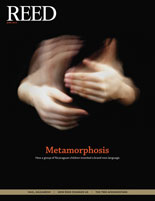
IRIS login | Reed College home Volume 92, No. 2: June 2013
Reediana
The Walking (Bloomsbury USA, 2013)
Laleh Khadivi ’98
By Angie Jabine ’79

The paths of two Kurdish brothers, driven out of Iran by 1979’s Islamic revolution, diverge forever in The Walking, the second installment of Laleh Khadivi’s three-part family saga. On the run from imprisonment or worse, they village-hop their way to the Turkish border, find factory jobs, and trade their wages for a berth on a freighter that will spit them out at a nameless port in the Azores. Every day the brothers argue—what to do, where to go next?
Ali, the elder brother, wants no part of exile—his dearest wish is to return to his girlfriend and the life he’s always known. But his younger brother, Saladin, named for the Kurdish warrior who defeated Europe’s crusaders, has always had bigger dreams. So obsessed with Hollywood glamour that he once tried to dig his own swimming pool, he fantasizes about living in Los Angeles, with its mansions, its pinup girls, its skewed reality where a B-movie actor can become President. Saladin nearly kills himself getting to L.A., then courts starvation on its indifferent streets before an Iranian rug dealer gives him a job and finds him a place to live.
America is famously a nation of immigrants, and each group arrives with its own cultural baggage. The 444 days when Iranian revolutionaries held 52 Americans hostage in their own embassy were not an easy time to be Iranian in America. Better to say you’re Spanish or Italian, or to call yourself “Persian.” Khadivi, who was two years old when her family left Iran, weaves her own relatives’ recollections into what is destined to become a classic refugee tale. She told Reed in 2011 that she struggled to find a structure for the book until she reread John Steinbeck’s The Grapes of Wrath, which gives voice not just to Tom Joad and his family but to all the Dust Bowl refugees. It was a good call. Disoriented, unmoored, yet still hopeful, the many Iranian voices in The Walking swell into a resounding clamor.


LATEST COMMENTS
steve-jobs-1976 I knew Steve Jobs when he was on the second floor of Quincy. (Fall...
Utnapishtim - 2 weeks ago
Prof. Mason Drukman [political science 1964–70] This is gold, pure gold. God bless, Prof. Drukman.
puredog - 1 month ago
virginia-davis-1965 Such a good friend & compatriot in the day of Satyricon...
czarchasm - 4 months ago
John Peara Baba 1990 John died of a broken heart from losing his mom and then his...
kodachrome - 7 months ago
Carol Sawyer 1962 Who wrote this obit? I'm writing something about Carol Sawyer...
MsLaurie Pepper - 8 months ago
William W. Wissman MAT 1969 ...and THREE sisters. Sabra, the oldest, Mary, the middle, and...
riclf - 10 months ago